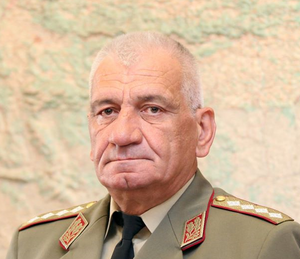Nikodemos Cvetkov
Nikodemos Cvetkov | |
|---|---|
 Cvetkov in 2013 | |
| Born | 13 September 1953 Sena, Syara |
| Allegiance | |
| Service/ | Army of the Syaran Republic Syaran National Army |
| Years of service | 1976-2014 |
| Rank | Field Marshal |
| Unit | Army Group Alpha |
| Battles/wars | Refusal War Imerti Conflict Zemplen War |
| Awards | see below |
Nikodemos Cvetkov is a Syaran former general and field marshal best known for commanding Army Group Alpha during the Zemplen War.
An ethnic Makedonian, Cvetkov was one of the few Makedonian officers of the Army of the Syaran Republic who defected to the Wardens during the Refusal War. After the Warden victory Cvetkov was comissioned into the Syaran National Army. He rose through the ranks throughout the 1990s before being promoted to Lt. General in 2002. Cvetkov commanded Syaran forces during the Imerti Conflict, succesfully pushing Ruvelka out of Imerti. After the war Cvetkov was promoted to Colonel General. Upon the outbreak of the Zemplen War Cvetkov took command of Syaran forces in the north, driving Ruvelkan troops from Imerti once again during the August Offensive. He was promoted to Field Marshall in late August and given command of the newly formed Army Group Alpha for Operation Aspis. His forces drove eastward into Ruvelka before being halted at the Battle of Sarud. Cvetkov reconstituted his forces and parried the diversionary efforts of the Ruvelkans opposite him during the Ruvelkan Winter Counter-Offensive. In May of 2009 Cvetkov launched Operation Harpe which resulted in the capture of the Ruvelkan cities of Kapsovar and Kunhegyes, however the heavy losses suffering during the operation put his forces on the defensive for much of the rest of the war. During the final Ruvelkan offensive known as Operation Homefront, Cvetkov succesfully withdrew the bulk of his forces west, although he was forced to sacrifice several units to preserve the integrity of his forces. Cvetkov retired in 2014.
During his tenure Cvetkov was considered an able commander by both his peers and the Ruvelkans, most notably in his ability to make rapid decisions in the midst of battle or in tenuous circumstances. He had a difficult relationship with his subordinates at times, whom he often clashed with in terms of strategy and planning.